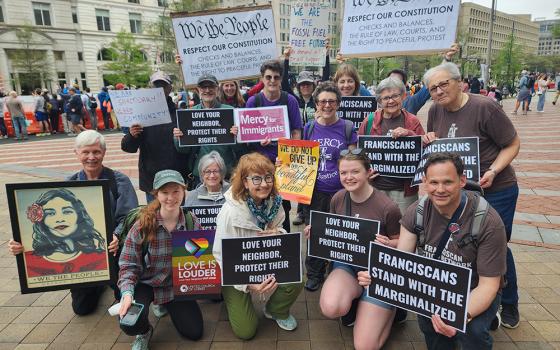Most of the time, disagreements with my good friend and colleague, Michael Sean Winters, are confined to longish phone conversations that usually end with an update on his three canine “kids.”
I feel compelled, however, to answer his posting this morning on “The Left’s Myths About Syria,” in this space for two reasons: I find it logically tortuous about a very serious matter and surprisingly faulty in its representation of the NCR editorial to which it refers.
Let me preface the response, however, with an appreciation for the complexity of this issue. If there is a certain NCR “orthodoxy” on such matters, it is that it leans instinctively toward non-violent solutions. But that doesn’t presuppose an easy answer to such difficult questions as how to respond to brutal dictatorships. I am grateful, too, that NCR is big enough to hold differing opinions and to allow a robust discussion of a very complicated subject.
Of the four myths that Winters raises, I would take on the first two quickly. Being skeptical of an administration’s depiction of intelligence as it pursues a justification for unilateral military intervention is a sign that a populace can learn from recent experience. The comparison – of a need to know with more certainty than we demanded of the lemming response to the cry of “weapons of mass destruction” with Eisenhower’s need for secrecy in planning the Normandy invasion – is inherently flawed. We are not, at the moment, combatants; we have not been threatened; our involvement has not been widely requested. In fact, the United States can’t find anyone to join in this fight.
The second – a put down of the “give peace a chance” outlook – is indeed fitting if “Miss New Jersey” is the one handing out international advice. The presumption that not taking military action is a concession that somehow peace exists in Syria borders on insulting. In this instance, we’ll thank not Miss New Jersey but Pope Francis, following in the steps of his most immediate predecessors, who sees no cure for the existing violence by applying even more violence. It is not naivete but sad experience that informs that opinion.
In referring to the editorial paragraph that notes U.S. complicity in Iraq’s use of chemical weapons during its eight year war with Iran and against the Kurds, Michael argues: “This is like saying that because the United States once countenanced slavery, we have no business confronting the scourge of human trafficking today.” Indeed, it is precisely because we once countenanced slavery, he correctly argues, that “our obligation to oppose it now is greater.”
That is true, but the point made in the editorial is not that the United States, given that recent history, should refrain from pointing out the evil, but that it would find it difficult to speak from some moral high ground – especially to the degree justifying war. It took us hundreds of years to acknowledge the sin of slavery. In the 72 hours of endless TV talk and newspaper commentary about Syria over the past weekend -- granting that I may have missed something – I heard or read no reference to our willingness to have a dictator we considered an ally at the time use chemical weapons on a very wide scale. That’s a version of either mass ignorance or societal amnesia.
Most confusing was Winters’ dismissal of the editorial’s point that if military intervention occurs it should not be unilateral. He argues that seeking international cooperation rings hollow because “international law is a fiction.” At the same time he argues for engagement because of the often touted international agreement against the use of chemical weapons. Those norms exist, of course, because of international conventions and treaties. If there is no international law, you have no argument for intervention on any premise. Quite a difference exists between claiming there’s no international law and acknowledging that its enforcement is quite problematic. But one can’t lean in one instance on the support of a law that , in another instance, is said not to exist. One would fall.
Finally, Winters is most disappointed with NCR’s refusal to acknowledge a responsibility to protect. The very point, of course, is that the administration is not proposing to protect anyone, only to respond in some manner to a “red line” violation. This is military intervention as punishment, a category to be found nowhere in Catholic social teaching or the criteria of the just war theory.
And so goes the back and forth on items about which we disagree. The larger point arrives, I think, in knowing that in conversation Winters and I eventually arrive much closer to agreement on many of the arguments listed than is possible in print. That suggests, perhaps, a much greater ambivalence than most of us would like to admit over this matter of confronting international evil in the 21st century.
It seems that Obama is a very reluctant warrior not because he hesitates to use force – the killing of Osama Bin Laden and the repeated use of drones in sovereign countries with whom we are not at war should dispel that notion. It would appear his hesitation is more likely a realization of the limits of military power to achieve solutions to 21st century problems.




